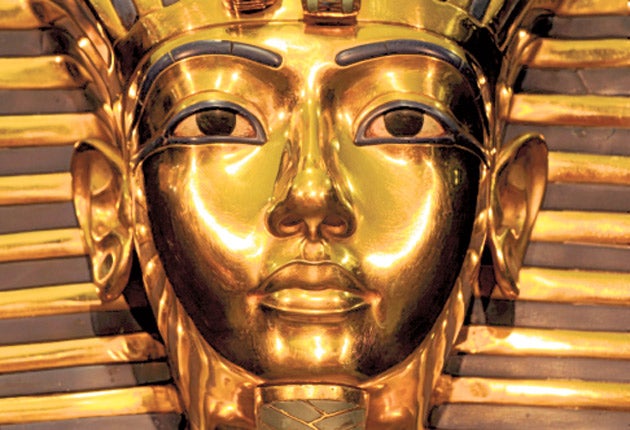The Week in Radio: Tunes from the tomb are something to treasure

Is it possible to hear the past? In one way, obviously. Given the BBC's propensity for repeats, archive documentaries and Hundred Object odysseys, we're hearing it all the time. The impulse to connect with and repackage the past seems ever present. But it's rare to encounter such a shivery sci-fi feeling as in Radio 4's Ghost Music, which this week transported us 3,000 years back to the Valley of the Kings.
While everyone else was focusing on the Egyptian Spring, the thoughts of archaeologists rested more tremulously on the fate of a cache of objects stolen from the Cairo Museum. They included a bronze trumpet, which along with its silver companion, was found in Tutankhamun's tomb. Ghost Music told the story of these trumpets, and in a double reflection of the past, recounted the 1939 experiment in which Rex Keating, a BBC commentator, managed to record them being played.
"I dropped my hand, and sharp and clear this silver music out of Egypt's past goes echoing to the four corners of the Earth," he proclaimed, the way commentators just don't any more. And BBC commentary style isn't all that's changed. "The idea of actually playing a 3,000-year-old trumpet wouldn't be entertained today," shuddered the archaeologist Christine Finn, "but in the gung-ho archaeological heyday of the early 20th century, there were no such qualms." Yet while he may have escaped the opprobrium of historians, Keating did get blamed for invoking the curse of Tutankhamun, and inadvertently starting the Second World War. Meanwhile, how to describe the time-travelling sound of the trumpets? Well, for me (having written a novel about Howard Carter's discovery), it was exquisitely eerie, but I reckon the fanfare that accompanied the dead king to the underworld would have raised the hairs on anyone's neck.
It may be we need to think of new ways to talk about the past, suggested the neuroscientist Raymond Tallis on Radio 3's Belief. "What do we mean by 'move through time?' We spatialise time, we need a way of thinking about time that doesn't reduce it to the emptiness that physics has moved it to," he argued. This is a magnificent series, showing just how important it is to give profound thinkers space to explain their deepest beliefs, and Joan Bakewell is appropriately receptive, providing only gentle touches on the rudder. Born in Liverpool, Tallis acquired "the freefloating scepticism that scousers tend to have", and, as an atheist, he remains sceptical about "any attempt to translate feelings of transcendence into some kind of institutionalised structure". Yet he retains an uplifting belief that there is something about consciousness that science cannot explain. He was also appealingly frank. "I don't understand how mind fits into the world of matter," he said, cheerfully. "But I'm confident no one else does either."
There's an obvious timeliness about Russia: the Wild East, Martin Sixsmith's epic exploration of Russia that started this week, but although the BBC's former Moscow correspondent may bring the necessary insight, the series got off to an underwhelming start. We began in Novgorod with the story of Rurik, the Viking chieftain credited with forming Russia. Suggesting that a craving for centralised power is ingrained in the Russian psyche, Sixsmith explained that the word "state" implies not impartial government but a "Lord-dom" dependent on the whim of an autocratic ruler. Another key development for Russia came when Prince Vladimir chose Christianity over Islam because "drinking is the joy of the Russians". In 1015, his sons Boris and Gleb were murdered and made martyrs for offering no resistance, an act that Sixsmith said entrenched the idea that the good of the state justifies ultimate self sacrifice. Fascinating as this analysis is, it's a shame it has to be delivered in 15-minute, tea-time gobbets. A story as epic as Russia's requires more space – and of course more time.
Join our commenting forum
Join thought-provoking conversations, follow other Independent readers and see their replies
Comments
Bookmark popover
Removed from bookmarks